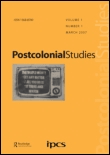
Postcolonial Studies
Scope & Guideline
Engaging with the past to understand the present.
Introduction
Aims and Scopes
- Interrogation of Colonial Legacies:
The journal emphasizes the need to interrogate the lasting impacts of colonialism and imperialism on cultures, identities, and power dynamics in former colonies. - Decolonial Perspectives:
It promotes decolonial approaches that challenge traditional Western narratives and methodologies, seeking alternative frameworks rooted in indigenous and local knowledge systems. - Cultural and Literary Analysis:
Postcolonial Studies explores literature, art, and cultural practices as sites of resistance and re-imagination, examining how these forms reflect and shape postcolonial identities. - Intersectionality and Social Justice:
The journal focuses on the intersections of race, gender, class, and disability within postcolonial contexts, advocating for social justice and equity. - Global and Transnational Frameworks:
It encourages research that transcends national boundaries, examining global connections and the transnational dimensions of postcolonial experiences.
Trending and Emerging
- Decolonization and Indigenous Knowledge:
A significant trend is the focus on decolonization processes and the resurgence of indigenous knowledge systems, emphasizing the importance of local epistemologies in challenging colonial legacies. - Disability Studies and Postcolonialism:
The intersection of disability studies with postcolonial theory has gained traction, highlighting how colonial histories shape experiences of disability and the politics of inclusion. - Ecological and Environmental Perspectives:
Emerging research increasingly addresses the ecological implications of colonialism, linking environmental justice with postcolonial studies to explore themes such as resource extraction and climate change. - Global Islamophobia and Coloniality:
The examination of Islamophobia through the lens of coloniality is on the rise, reflecting contemporary geopolitical tensions and the need to understand these issues within broader historical frameworks. - Anticolonial Connectivity:
There is a growing interest in the concept of anticolonial connectivity, exploring how global movements and solidarities challenge colonial structures and foster collective resistance.
Declining or Waning
- Traditional Postcolonial Critique:
The conventional frameworks of postcolonial critique that primarily focus on the binary of colonizer versus colonized have become less prevalent, as scholars increasingly seek more nuanced and intersectional approaches. - Narrow National Histories:
Research centered solely on specific national histories without considering transnational contexts appears to be diminishing, as there is a growing recognition of the interconnectedness of global histories. - Static Theoretical Frameworks:
There is a noticeable decline in the application of static theoretical frameworks, such as essentialist notions of culture or identity, as scholars move towards more fluid and dynamic understandings.
Similar Journals
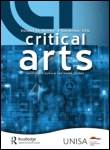
Critical Arts-South-North Cultural and Media Studies
Navigating the Complexities of Media and SocietyCritical Arts-South-North Cultural and Media Studies is a distinguished academic journal published by Routledge Journals, Taylor & Francis Ltd, focusing on the interdisciplinary study of cultural and media dynamics in both southern and northern contexts. Established in 1980, the journal has grown to become a vital platform for scholars, professionals, and students interested in unpacking the complexities of culture, media, and communication across diverse sociopolitical landscapes. With an impressive Q1 ranking in Cultural Studies and a strong presence in the Q2 category for Arts and Humanities and Communication, the journal ranks favorably within Scopus metrics, reflecting its high-quality and impactful research contributions. Although it does not currently offer open access, its comprehensive reviews, articles, and discussions serve as an essential resource for advancing critical thought and fostering scholarly dialogue in the field. The journal encourages the submission of original research papers, theoretical essays, and critical commentaries that challenge conventional narratives and promote interdisciplinary approaches, making it a cornerstone for anyone engaging with media and cultural studies.

PORTUGUESE STUDIES
Fostering Dialogue on Portuguese HeritagePORTUGUESE STUDIES is a prominent academic journal published by the Modern Humanities Research Association, dedicated to exploring the rich tapestry of Portuguese culture, history, and literature. With its ISSN 0267-5315 and E-ISSN 2222-4270, the journal has been a vital resource for scholars since its inception in 2002 and continues to contribute valuable insights into the study of Portuguese heritage. Operating from its base in the United Kingdom, the journal encompasses a diverse range of topics that reflect its dynamic scope within Cultural Studies, History, and Literature and Literary Theory. Although currently not categorized as Open Access, the journal's scholarly contributions have attained respectable Scopus rankings, with Q4 and Q3 placements illustrating its growing influence within the academic community. Researchers, professionals, and students alike will find PORTUGUESE STUDIES an indispensable platform for enriching their understanding and discourse on Portuguese affairs, ensuring its crucial role in fostering intellectual engagement and discovery in the humanities.
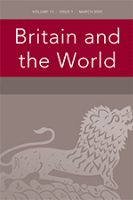
Britain and the World
Unraveling the Threads of HistoryBritain and the World is a notable scholarly journal published by Edinburgh University Press, dedicated to advancing the field of history through comprehensive analyses of Britain's historical interactions with the world. Since its inception in 2009, the journal has fostered interdisciplinary research, examining themes ranging from colonialism to post-colonial studies, as well as the socio-political dynamics that shaped Britain's global influence. With no open access model currently available, Britain and the World provides a robust platform for scholars dedicated to investigating the complexities of British history in a global context. Although currently categorized in the fourth quartile (Q4) of history journals, its commitment to quality scholarship and its strong editorial oversight promises to enhance its stature in academia, making it an invaluable resource for researchers, professionals, and students seeking to deepen their understanding of Britain's role in global affairs. For those interested in contributing to the discourse or exploring its published works, the journal is based in the United Kingdom at The Tun-Holyrood Rd, 12 2F Jacksons Entry, Edinburgh EH8 8PJ, Scotland.

De Arte
Advancing Cultural Discourse Through ArtDe Arte is a distinguished journal dedicated to the field of Cultural Studies, published by Routledge Journals, Taylor & Francis Ltd. Since its inception in 1967, the journal has served as a critical platform for scholarly discourse, exploring the intersection of the arts and cultural dynamics. With an Impact Factor reflecting its quality and relevance in the academic community, De Arte is committed to advancing knowledge through rigorous research. It currently holds a Category Quartile ranking of Q3 in Cultural Studies according to the 2023 metrics, and is indexed in Scopus, ranking #1024 out of 1304 in the Social Sciences subcategory. Although it operates under a traditional publishing model, the journal ensures broad access to its insightful publications. The journal invites researchers, professionals, and students to contribute and engage with contemporary cultural issues, making it an essential resource for those invested in the arts and humanities.
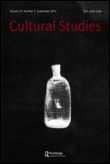
CULTURAL STUDIES
Advancing Knowledge in Cultural DynamicsCULTURAL STUDIES, published by Routledge Journals, Taylor & Francis Ltd, is a prestigious academic journal dedicated to the exploration and analysis of cultural phenomena across diverse contexts. With an ISSN of 0950-2386 and an E-ISSN of 1466-4348, this journal has established itself as a leading platform for scholars, researchers, and practitioners interested in the intersections of culture, identity, and society. Since its inception, CULTURAL STUDIES has transitioned through several converged years of publication, currently producing cutting-edge research that reflects its strong positions in Q1 quartiles across multiple disciplines, including Anthropology, Social Sciences, and Arts and Humanities. With an impressive Scopus rank of 75/1304 in Cultural Studies, the journal is an essential resource for those seeking to engage with the latest theoretical frameworks and methodologies in understanding cultural dynamics. Although it is not currently open access, CULTURAL STUDIES remains a critical vessel for disseminating knowledge that impacts both academic and practical applications in cultural analysis. For scholars and students eager to contribute to this vibrant field, the journal serves not only as a repository of knowledge but also as an inspiration for further inquiry into the complexities of culture.

DIALECTICAL ANTHROPOLOGY
Bridging Disciplines Through Rigorous ScholarshipDIALECTICAL ANTHROPOLOGY, published by SPRINGER, is a prestigious journal within the field of anthropology, recognized for its substantial contributions to dialectical and critical theory in social research. Since its inception in 1975, the journal has carved a niche by exploring the intersections of culture, society, and politics, making it an essential resource for scholars and practitioners. With an impact factor that places it in the Q2 category for both anthropology and arts and humanities, and significant rankings in sociology and political science, it reflects a solid scholarly reputation. The journal operates on a subscription basis, allowing for a wide dissemination of rigorous academic research without open access. With ISSN 0304-4092 and E-ISSN 1573-0786, DIALECTICAL ANTHROPOLOGY serves as a crucial platform for fostering dialogue and advancing knowledge in contemporary anthropology and related disciplines. As a researcher, professional, or student, engaging with the insights presented in this journal will deepen your understanding of the dynamic interplay between structural and agency-oriented perspectives in social contexts.
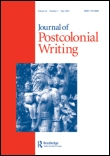
Journal of Postcolonial Writing
Advancing Critical Perspectives on Colonial HistoriesJournal of Postcolonial Writing, published by ROUTLEDGE JOURNALS, TAYLOR & FRANCIS LTD, stands as a pivotal platform in the field of postcolonial studies and literary theory. Since its inception in 2005, this esteemed journal has cultivated a dedicated space for scholarly discourse, focusing on the complex interplay between literature, culture, and colonial histories. With an impressive Q1 ranking in the 2023 Literature and Literary Theory category and a notable Scopus rank of 97/1106, the journal occupies a vital place in the academic landscape, achieving a significant percentile of the 91st. Researchers and students alike will find the journal’s commitment to exploring diverse narratives and critical frameworks invaluable, making it an essential resource for those engaged in contemporary literary scholarship. Although not open access, readers can access high-quality research that contributes to meaningful conversations within the discipline, supporting the journal’s objective to foster interdisciplinary collaboration and innovation.
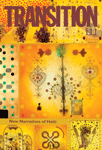
Transition
Bridging Disciplines Through Scholarly DiscourseTransition is a distinguished academic journal published by Indiana University Press and is essential in the interdisciplinary field of cultural studies and social transformation. With an ISSN of 0041-1191 and an E-ISSN of 1527-8042, this journal publishes insightful research and critical analyses that explore themes of identity, community, and change in contemporary contexts. Although currently not categorized as an open access publication, its contributions to understanding the dynamics of transition and its profound impact within society make it a valuable resource for researchers, professionals, and students alike. By fostering dialogues that traverse various genres and academic disciplines, Transition remains at the forefront of scholarly discourse, attracting a global audience and contributing under the rigorous standards of a reputable academic community.
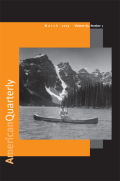
AMERICAN QUARTERLY
Exploring the Depths of American Culture and HistoryAMERICAN QUARTERLY, published by Johns Hopkins University Press, stands as a prestigious journal in the fields of Cultural Studies and History, reflecting its remarkable reputation with a Q1 ranking in both categories as of 2023. With an ISSN of 0003-0678 and an E-ISSN of 1080-6490, this journal serves as a vital platform for interdisciplinary scholarship, exploring diverse narratives and critical theories that shape the American experience. Although it does not currently offer open access, AMERICAN QUARTERLY remains an essential resource for researchers, professionals, and students committed to understanding the complexities of cultural and historical dynamics. Its rich interdisciplinary approach and rigorous peer-review process ensure that the journal consistently publishes high-quality articles that resonate with contemporary global discussions, making it indispensable for anyone looking to contribute to or enhance their understanding of American culture and history.
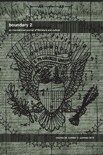
BOUNDARY 2-AN INTERNATIONAL JOURNAL OF LITERATURE AND CULTURE
Challenging Conventional Paradigms in ScholarshipBOUNDARY 2: An International Journal of Literature and Culture, published by Duke University Press, stands as a pivotal platform for interdisciplinary discourse at the intersection of literature, culture, history, and the social sciences. With an ISSN of 0190-3659 and an E-ISSN of 1527-2141, this journal uniquely addresses the complexities of cultural narratives and theoretical frameworks from 2002 to the present. Although it is not an open-access publication, its rigorous scholarship and critical insights have positioned it within esteemed quartiles: Q3 in Cultural Studies, Q2 in History and Literature and Literary Theory, and Q4 in Sociology and Political Science for 2023. As the academic landscape evolves, BOUNDARY 2 continues to challenge conventional paradigms, making it an essential resource for researchers, professionals, and students eager to explore contemporary issues in literature and culture.